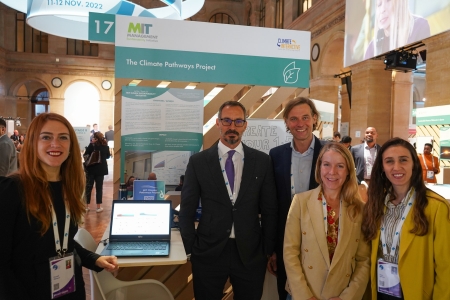AKDN at the Paris Peace Forum 2022 2022-11-15
Paris, France, 11-12 November 2022 - How do we ride out the multicrisis that the world is experiencing right now? From worsening climate change, successive Covid-19 waves and deepening inequalities, to new and lasting geopolitical conflicts of global consequences, the stakes could not be higher. How do we prevent a destructive world polarisation that would jeopardise collective efforts on critical challenges for humanity?
The 2022 Paris Peace Forum convened world leaders and civil society to seek answers to these questions in Paris on 11-12 November.
The Aga Khan Development Network (AKDN) is a Founding Member of the Forum, alongside the French government and other selected organisations. AKDN was represented at the Forum by Prince Amyn, who is a member of the Forum’s Executive Committee, as well as Prince Rahim, who attended for the first time.
"We are facing a convergence of crises, but I want to challenge us all to aim higher than just riding out the storm….It’s time for a paradigm shift, and that will take four critical realignments: renewing our faith in truth, recognising that we all have equal worth, safeguarding the future and believing in our ability to remake the world as we wish it could be, as we know it can be."
Her Majesty Queen Rania Al Abdullah of Jordan
In addition to exploring new ways to manage the fallout of the multicrisis – which agencies of the AKDN are responding to across Central and South Asia, Eastern Africa and the Middle East – AKDN leaders discussed with partners new ways to cooperate through conflicts; catalyse climate and environmental solutions; and foster more inclusive and just societies.
Matt Reed, the CEO of the Aga Khan Foundation UK, spoke about how AKDN’s work is continuing in Afghanistan. He pointed out the progress in Afghanistan over the past two decades, with substantial improvement in maternal and infant mortality, youth literacy and education levels. He also referenced the strengthening of local community structures during this period. These are still active and allow development programmes to continue.
The discussions were as varied as the difficulties facing the world. Topics ranged from the geopolitical (How to better protect civilians in 21st century conflicts; Reinventing international health cooperation through regionalization; Feminist foreign policy in action) to emerging issues such as Leveraging the potential of genomic sequencing, South-South cooperation in cyber capacity building, and Managing AI risk.
A distinctive feature of the Forum is support for concrete projects that function as instruments of law, standards, and good practices, or build new institutions, mechanisms, and innovations. Over 60 projects were selected for exhibition at the Forum. The Climate Pathways Project by MIT, for example, is expanding the reach of a climate solutions simulator that is used by decisionmakers to see the impacts of global climate policy decisions on societal factors.
Ten projects were chosen by an expert jury to receive a year of support from the Forum’s Scale Up programme to raise funds, increase their visibility and implement their plans. The projects are based in different continents and vary in their aims and methods. One uses millions of data points to automatically assess the non-financial impact of businesses, directing finance to companies that make both a profit and a difference. Another provides a platform to strengthen the resilience of youth in Central Asia to online disinformation and hate speech.
President Macron of France led a panel discussion on universalism in the face of war. He said: “Behind the word universalism are three things. The fact that our problems are universal…inequality, climate change, biodiversity, peace, food security… There is a universalism that is linked to human dignity… and thirdly, there is geopolitical universalism… the right to autonomy, sovereignty, territorial integrity.”
David Beasley, the Executive Director of the World Food Programme, spoke about how the lack of food exports from Ukraine and fertiliser from Russia have compounded COVID’s destructive economic effects, which, combined with widespread droughts, have resulted in a disastrous impact on food security, particularly for the poorest countries. “We’re facing a food pricing problem right now. Next year, we’ll be facing a food availability problem.”
A session on embedding culture at the core of policies and cooperation explored the opportunities of digitalisation, the importance of youth, the insights brought by different languages and the challenges of enabling cultural expression for all.
- 732 reads

